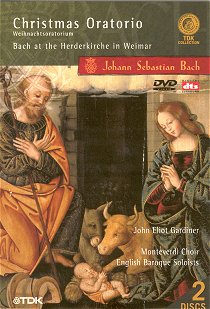In the year 2000, John Eliot Gardiner set out on his
Bach Cantata Pilgrimage, with the goal of performing all of Bachís sacred
cantatas in churches around Europe and in New York. Over a 52-week period,
his orchestra, choir and soloists achieved this unique goal, with a
fervour that was almost religious. Just before beginning his cantata
performances, however, he performed the Christmas Oratorio in Weimar,
in a beautiful church, on two days, as this work was originally performed.
Bachís Christmas Oratorio is among his most joyous
music. Although not actually an oratorio - it is really a series of
six cantatas - it was written for the 1734-1735 Christmas celebration
in Leipzig. Curiously, to illustrate this, the most sacred of Christian
celebrations, Bach chose to "parody" many movements from secular
cantatas. But he certainly made fine choices; this music is moving and
unforgettable.
Gardiner has a special touch with Bachís music. He
chooses excellent musicians and singers, uses reasonably-sized forces,
and his tempi have the right balance between élan and introspection.
This recording uses about a dozen musicians and a choir of about twenty,
giving the music a very intimate feeling - this is light years away
from the heavier performances of this work where a large choir drowns
out the musicians.
The musicians are all excellent - one is delighted
to hear the excellent oboist Marcel Poncelle, and to recognize many
other familiar faces from Gardinerís usual group of performers. The
soloists are top-rate as well. Alto Bernarda Fink shines in her many
solos, especially the long aria in the second part, Schlafe, mein liebster,
where her voice shows incredible purity. Tenor Christoph Genz, who also
serves as the evangelist, is also excellent - both in his arias and
his recitatives. Soprano Claron McFadden has a very limited performance
in this work; one can think that Bach did not have a very good soprano
available at the time, and scored very few movement for soprano. Nevertheless,
she has a beautiful voice; I would certainly like to here more of her.
Bass Dietrich Henschel is very good, though he, too, has a much more
limited role than the alto and tenor.
The choir is one of the high points in all of Gardinerís
Bach recordings. With a choir close to the size that Bach probably used,
Gardiner seems to use the choir as a soloist - the texture is always
rich and lush, and the choir sounds as if it were singing with one,
unique voice.
The 26-minute documentary on Gardinerís Cantata Pilgrimage
at the end of the first disc is excellent, and shows how Gardiner developed
such a mad project, but also shows how invested the musicians were in
this tour. The first documentary shows rehearsals for the performances
on this DVD, and is a shorter version of a BBC documentary which also
appears on Gardinerís Bach Cantatas DVD. The second documentary, which
is actually another section of the same BBC film, Bach Revisited, presents
Gardiner as he visits Saxony and Thuringia, visiting Bachís school,
the churches he performed in and other sites.
Gardiner is one of the finest interpreters of Bachís
vocal music, and this DVD shows this very well. Not only does the music
come through with great subtlety and emotion, but the quality of each
of the musicians and soloists is such that this performance is certainly
one of the finest.
Kirk McElhearn


